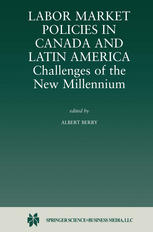

Most ebook files are in PDF format, so you can easily read them using various software such as Foxit Reader or directly on the Google Chrome browser.
Some ebook files are released by publishers in other formats such as .awz, .mobi, .epub, .fb2, etc. You may need to install specific software to read these formats on mobile/PC, such as Calibre.
Please read the tutorial at this link: https://ebookbell.com/faq
We offer FREE conversion to the popular formats you request; however, this may take some time. Therefore, right after payment, please email us, and we will try to provide the service as quickly as possible.
For some exceptional file formats or broken links (if any), please refrain from opening any disputes. Instead, email us first, and we will try to assist within a maximum of 6 hours.
EbookBell Team

0.0
0 reviewsCanada and the countries of Latin America are in the midst of major changes and choices in the area of labor markets and related social policy. These decisions are likely to have profound consequences for the quality of life of workers throughout the hemisphere.
Labor Market Policies in Canada and Latin America: Challenges of theNew Millennium reviews the evidence of Canada and Latin America on three major labor policy instruments - unemployment insurance, minimum wages and training - and on the effects of the payroll taxes which are the main means of funding the unemployment insurance system and other components of social expenditure.
This is the first study attempting an in-depth comparison of these labor policy instruments between Canada and Latin America. The useful juxtaposition of Canadian and Latin American experiences comes at a time when the trend in Canada is to back away from the perhaps overly generous or ineffectively administered elements of the labor legislation/social security net and when Latin American countries have undertaken significant reforms of their past systems but require further changes to move toward the sorts of legislation and support systems that characterize developed countries. The experiences of Canada and Latin America are mutually relevant since all are small economies forced to adjust to events at the world or hemispheric level and most are inclined to approach policy in an intermediate fashion which falls between the more market-oriented American and the more interventionist European models.
Together with its comparative aspect, this volume attempts a more balanced and in-depth assessment in each of the policy areas than has hitherto been available. The gradually increasing base of available empirical data on the period after the reforms has been used in the studies, which provide thorough syntheses of the available research for Canada and Latin America.